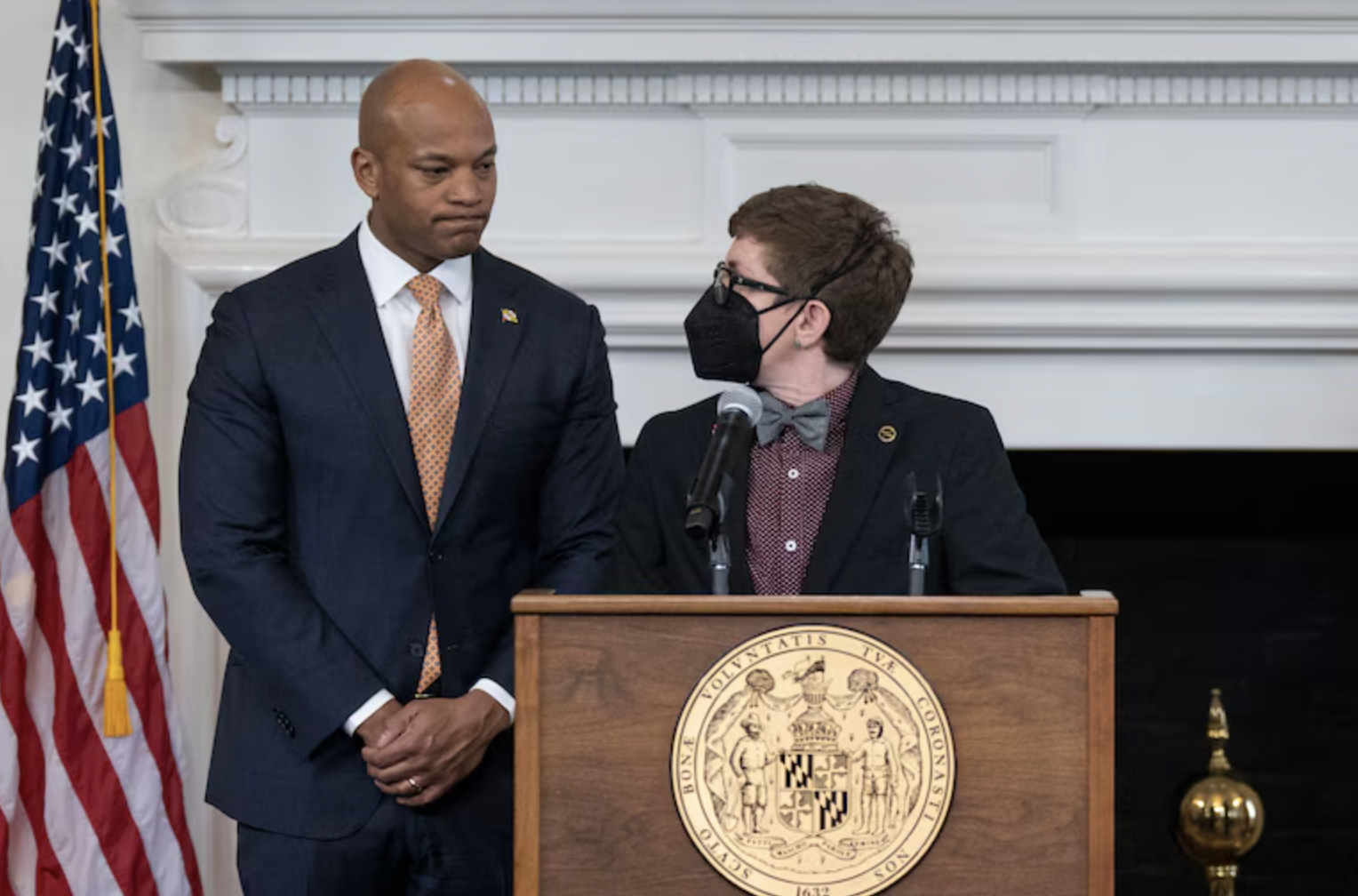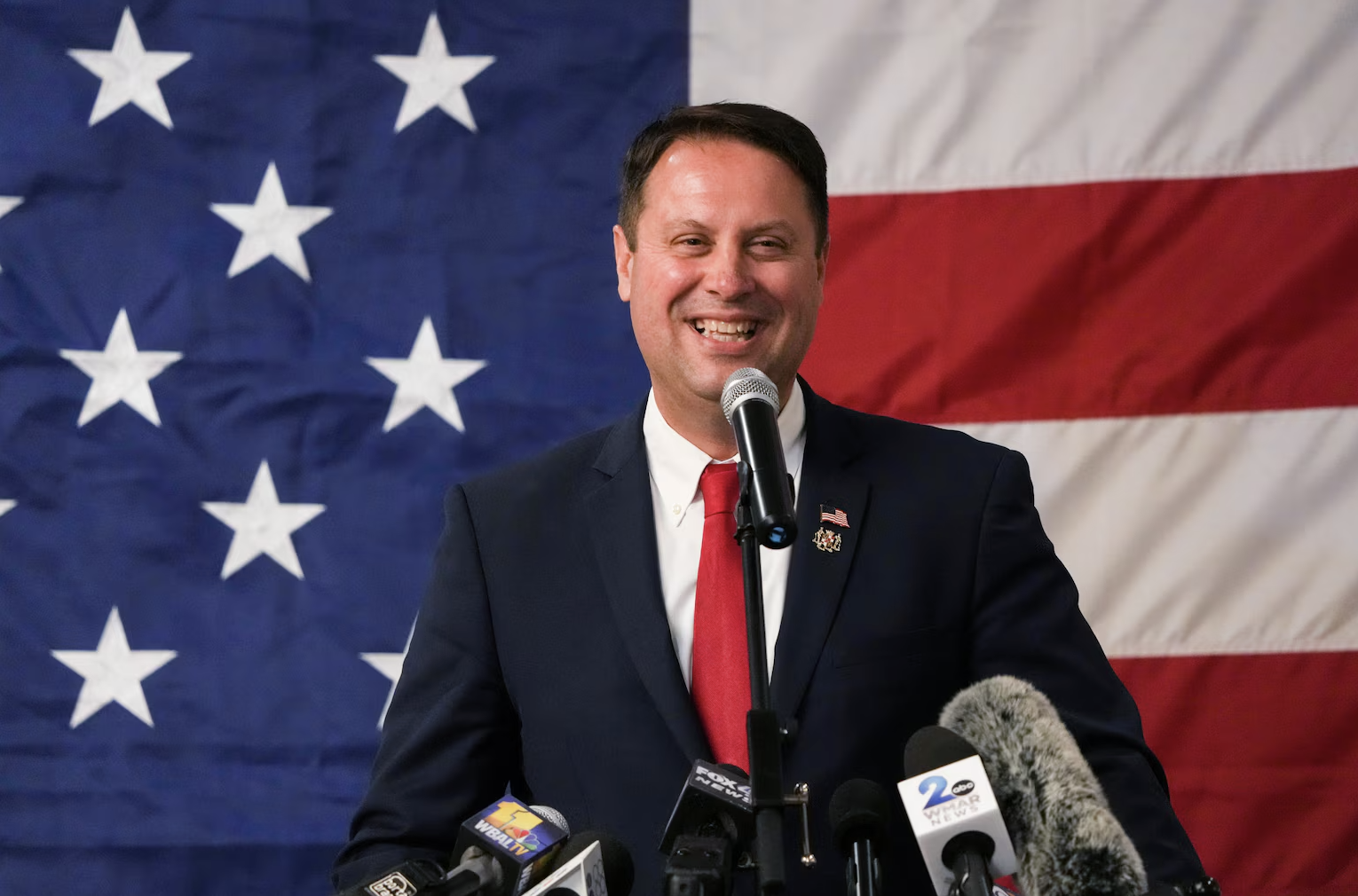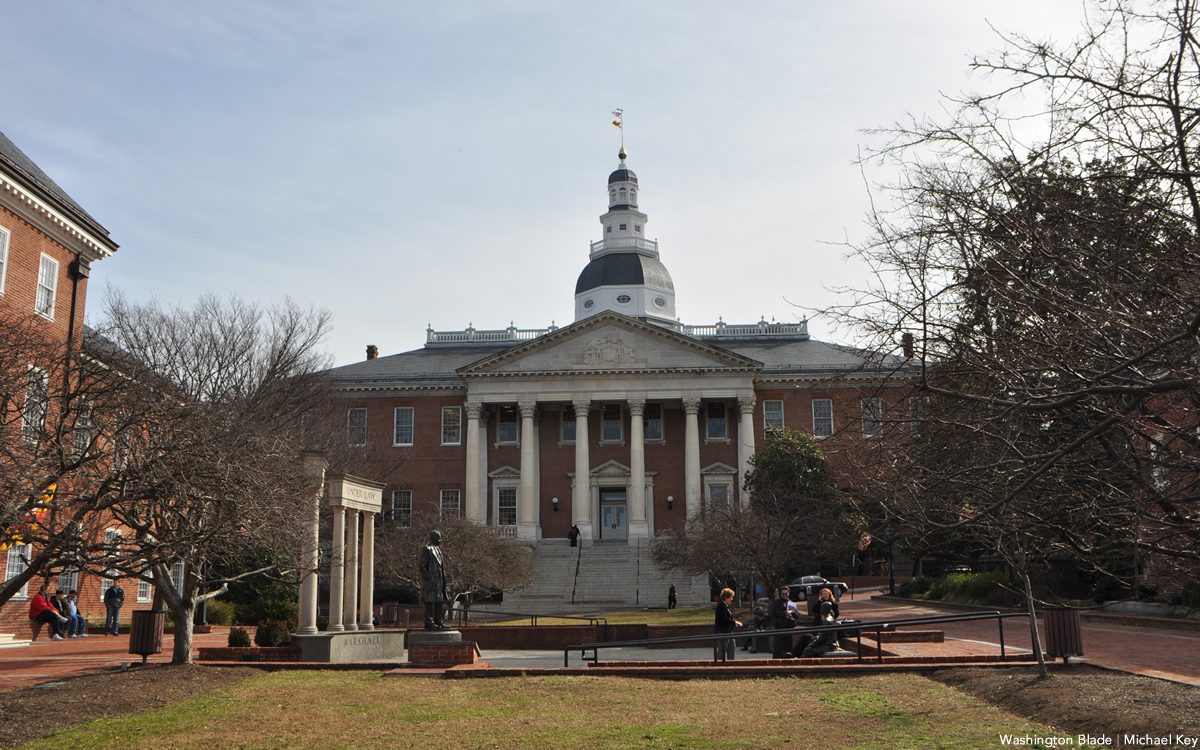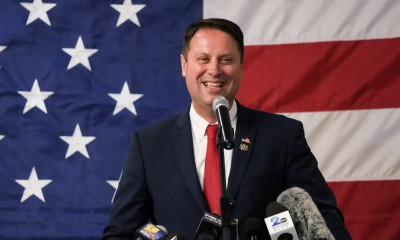Maryland
Trans Maryland founder: Trans people ‘are afraid’
Lee Blinder urged Gov. Wes Moore to do more for trans rights

The Washington Blade on April 4 spoke with Lee Blinder, founder and executive director of Trans Maryland.
Trans Maryland, formerly Trans Healthcare MD, is what the organization’s mission statement describes as a “multi-racial, multi-gender, trans-led community power building organization dedicated to Maryland’s trans community. By trans folks, for trans folks.” The Blade reached out to Blinder after they confronted Maryland Gov. Wes Moore on the Transgender Day of Visibility.
BLADE: It was reported in the Baltimore banner that you confronted Wes Moore about his inaction to the rise of anti-trans rhetoric during this administration. So would you mind going a little bit deeper into that?
BLINDER: The intention of what I shared is to show to the governor that this is a community in distress. You know, we are in a real state of emergency for the trans community and there are very few opportunities that the community has to share this directly with the governor. What we wanted out of that conversation was to not only be heard, but to see functional action. We’re really grateful to the governor for everything that he’s done in the past for this community, but the circumstances have changed and we really need to see very specific actions taken in order to ensure this community has the ability to exist in public space. um and that’s incredibly important to both myself as well as all the community members that I’m talking to.
It is not an absent issue. It is a very forefront connected to every single part of our daily lives as trans people in the state of Maryland. And so we want to see our leadership, you know, being who we know what they can be for this community. I think that was that point of what I shared on Monday, attempting to convey all of the feedback that I’m hearing when I’m out in community that folks are sharing with me from both trans people and the families of trans people about what is urgently needed and that very specific action taken in order to ensure that, again, we can move out and exist in publicly.
BLADE: Have you heard anything specific recently about any threats, scares, or insecurities coming from trans Marylanders at all?
BLINDER: Oh, absolutely. Every trans person I’m talking to is having really difficult conversations amongst the community and amongst their families, whether chosen or families of origin. We’re seeing people are afraid right now. The federal government is targeting our community very directly. What that means is that people are noticing they’re taking note. They’re wondering what the actions that a supportive state like Maryland will be taking. We want to see a really specific messages being shared, as well as specific action being taken as a result of that.
Everything from our identity documents to the ability for some of our most vulnerable community members or children to participate in sports. Every aspect of public life for trans people is being targeted by this federal administration. Here trans Maryland, we have the largest name and gender marker change program for adults in the state and people are sharing very directly their concerns. People are concerned about their documents, about access to documents, about ensuring that if they need to, they can safely and effectively leave the country, if that comes to it. Those are really difficult conversations to be having. We’re a country where people have traditionally sought sanctuary and safe haven from other countries where the ability to live openly is trans and openly queer is not always possible. We’re in a really unique situation where we have people who are seeking asylum in the U.S. as trans people and then at the same time, we have people who are wondering what other countries, the policies of asylum, you know, could be for Marylanders. I think it really speaks to the state of the situation for trans people.
Every day, I’m very, very aware of how grateful I am and how lucky I am to be here in Maryland. I’m not running Trans Texas, Trans Florida, or Trans Oklahoma. My heart goes out to our siblings in those states where they’re receiving a tax from both the federal government and from their state government. We’re absolutely not in that situation in Maryland, and we have leadership like Gov. Moore to thank for that, but we also really need to be heard about this specific urgency of the situation that we’re in right now. We’re eager to partner with and to work with the governor. We want to find solutions so that the people that we’re serving and that we’re responsible for have what they need and are taken care of here.
BLADE: Are there any plans in place right now to help pick up the slack at all?
BLINDER: We’re certainly doing everything possible and trying to ensure that there aren’t state resources that aren’t being urgently and specifically immediately directed towards this population. We will continue to advocate for that and we will turn to the residents of Maryland beyond to fundraise so that we can ensure that we’re meeting those needs for people as much as we possibly can. We are a very grassroots organization. In many ways benefits us because we can be nimble and respond very quickly when situations happen, but we do work within systems and we want to see those systems responsive to trans people’s needs, and we want to see those systems taking action, particularly right now because things will continue to get more difficult. So the urgency of the time is very, very, very present.
BLADE: Given said urgency and also being grassroots, have you worked with any other organizations within the states?
BLINDER: We partner with and work with organizations all the time. We always prioritize both trans-led initiatives and work because as trans folks we are living our realities, so we know best what our communities need. We also work with larger systems, our name change program for example. We are helping folks navigate the process through the Maryland judiciary. Those are the larger, state-based systems that we want to see and collaborate with to ensure that they’re ready and prepared to work with the trans community and families of trans kids.
So, it is a great privilege and pleasure that we have to have so many amazing partners. We have for the last seven years gone to Pride festivals all over the state, and we work closely with all of those Pride organizations. When we started doing that, we were pretty much the only trans organization at almost all of those pride festivals, so it’s really wonderful now to see many more trans organizations are represented at those pride festivals. The Pride festivals are a really amazing way that we have connected with the community and that we’re accountable to the community. And so we’re sitting there at a table, folks can come up to us and share things are going well, if things aren’t going well, and what they need directly from us. That has been a real privilege to be able to just steward the needs of the community, to hear them and then to be accountable to and responsible to the community for our actions, what we do and how we serve. It is something that we are committed to and with that commitment we strive to make sure every member of the community is taken care of, seen, and represented.
BLADE: Have you heard of the report that recently came out from Mady Castigan and Tom Sayers about a lawsuit going on about the mistreatment of uh incarcerated trans women right now. specifically in Maryland prisons?
BLINDER: Not familiar with that specific lawsuit, but we have seen lawsuits about ] treatment. I think that there was a lawsuit, particularly of incarcerated trans women I believe a year or so ago where the judge had issued a preliminary injunction and a temporary restraining order requiring that a few women were moved to the correct housing. Currently, all of the incarcerated trans women that we are aware of are housed with men, which is against the recommendations of the Prison Rape Elimination Act (PREA) for housing and for folks’s safety. That court case also required that the individuals named would be required to be given their medications, their gender affirming hormone therapy on video because it was alleged that folks had not been receiving those medications even though they were prescribed to them. I’m not familiar if there’s something new within the last week or two. I would love to to learn more.
We were very involved in the Transgender Respect, Agency and Dignity Act, which is around conditions of confinement for transgender people. That bill did not come back into the legislature this year, but we are going to continue to be extraordinarily concerned with the treatment of incarcerated trans people in the state and are committed to working to both address those issues on a systemic basis and those as well on an individual basis for community members. For the individuals who are currently incarcerated, we want to ensure that they are receiving medications, that they should be receiving, they are housed according to where is safest for them, that they’re able to be referred to respectfully, that they are not experiencing violence based on their identity.
BLADE: With World Pride coming to Washington this June, do you feel like there’s going to be a need for a slight shift from that celebration to focus on the encroaching anti-LGBTQ rhetoric that’s very much becoming legislation.
BLINDER: Yeah, a really great question. And I think it makes me really grateful that I have access to some of our trans elders and certainly broader movement elders who can share a little bit with me about how our community has survived difficult times. I think a takeaway that I’ve had surrounds the challenges during the AIDS and HIV crisis where people were crossing names out of those address books. Page after page of their friends as they were dying. and have that amount of community loss and then, wondering, “how did people survive that experience?” Those who made it through the crisis and those who were supporting folks through the crisis as well.
What folks have shared with me is that it was so important to still go out and feel joy and dance and try to forget just for a little while about what was happening because otherwise, if we can’t find joy, that’s the one thing that they want to really steal from us is our ability to feel joy to to have pride in who we are and we just cannot let them have that. So I think the activism, all of the work that we do is so incredibly important, but in order to do this for several months, several years, decades, even, it really becomes so, so important to also make sure that we are pursuing joy and happiness wherever we can find it, wherever that joy is, you know, whether it’s going to pride, whether it’s having a quiet game night in your friends. However you best find joy, it is absolutely essential that we find that because, otherwise burnout is waiting right around the corner and we cannot afford to lose our brilliant activists, especially like the upcoming generation of activists. We cannot afford to lose folks in this movement. There aren’t that many of us and the key to making it through and not burning out is weaving joy tightly through all of this work.
I’m both trans and I’m also Jewish. My next-door neighbors growing up were Holocaust survivors. They were in Auschwitz. There was one couple, a woman, her sister and her sister’s husband. They were very close friends and they would all spend a lot of time together. The two sisters, they were both really short because they were deprived of nutrients when they were growing. One of them had been shot by Nazis while on a march, but both of them survived. I found I was so grateful to have gotten to meet them because these were folks who had been through such an unimaginably horrible experience. and they still liked people. They didn’t believe in God anymore, but they still liked people and they had a joy for a life that I found was really impactful to me to see.
It did make me know and believe that people can come through really terrible experiences and that the bonds that we create with one another and support that we offer to one another in community, for me, that’s what my trans elders and my queer elders have shared with me. My neighbors made it clear to me that the sun still keeps coming up every day regardless of whatever is happening on this planet. I really believe in continuing towards that world that we want to see happen So as pride is coming, whatever ways that we can find joy and ensure that we’re taking good care of one another and also ourselves too. That’s what will get us through.
BLADE: What does the future look like right now for Trans Maryland? What does the next move that you guys have going on to try to keep up the momentum while you have it?
BLINDER: I think we are going to win in the end, our community. You look at the data and generations that are coming up right now, even in this toxic climate, are extraordinarily more comfortable than my generation and the generations before me and sharing who they are. And Cisgender people keep making more of us, you know? So we’re going to continue to exist and we always will. The longer term vision is that I know that we are going to be here and we’ll always be here. There’s really nothing they can do about that. In the short term, you know, we’re going to continue to serve trans Marylanders and the families of trans people in Maryland. We’re going to continue to take care of one another and to try to find our joy wherever we can.
For me personally, how I get through is like a strong sense of defiance. If they want to take my joy, they can take it from my cold dead hand. What they want is for us to feel afraid and small and disempowered No, they cannot have that. They just can’t have it. So it’s like a anybody got a defiance streak in them just to find that defiant streak and say, absolutely not, they don’t deserve that from us.
**
Trans Maryland has a rally on April 22 with the MoCo Pride Center, in front of the U.S. Supreme Court before it hears Mahmoud v. Taylor, a case that will determine whether public schools violate parents’ religious freedom when they compel elementary school children to participate in instruction on gender and sexuality without notice or the opportunity to opt out.
Blinder is also a co-chair of the Coalition for Inclusive Schools and Communities that supports LGBTQ youth and inclusive schools and communities, along with Phillip Alexander Downie, the Rev. AliKofi K.C. Bell, and Adrian Hinderlie.
Maryland
4th Circuit dismisses lawsuit against Montgomery County schools’ pronoun policy
Substitute teacher Kimberly Polk challenged regulation in 2024

A federal appeals court has ruled Montgomery County Public Schools did not violate a substitute teacher’s constitutional rights when it required her to use students’ preferred pronouns in the classroom.
The 4th U.S. Circuit Court of Appeals in a 2-1 decision it released on Jan. 28 ruled against Kimberly Polk.
The policy states that “all students have the right to be referred to by their identified name and/or pronoun.”
“School staff members should address students by the name and pronoun corresponding to the gender identity that is consistently asserted at school,” it reads. “Students are not required to change their permanent student records as described in the next section (e.g., obtain a court-ordered name and/or new birth certificate) as a prerequisite to being addressed by the name and pronoun that corresponds to their identified name. To the extent possible, and consistent with these guidelines, school personnel will make efforts to maintain the confidentiality of the student’s transgender status.”
The Washington Post reported Polk, who became a substitute teacher in Montgomery County in 2021, in November 2022 requested a “religious accommodation, claiming that the policy went against her ‘sincerely held religious beliefs,’ which are ‘based on her understanding of her Christian religion and the Holy Bible.’”
U.S. District Judge Deborah Boardman in January 2025 dismissed Polk’s lawsuit that she filed in federal court in Beltsville. Polk appealed the decision to the 4th Circuit.

By PAMELA WOOD | Dan Cox, a Republican who was resoundingly defeated by Democratic Gov. Wes Moore four years ago, has filed to run for governor again this year.
Cox’s candidacy was posted on the Maryland elections board website Friday; he did not immediately respond to an interview request.
Cox listed Rob Krop as his running mate for lieutenant governor.
The rest of this article can be found on the Baltimore Banner’s website.
Maryland
Expanded PrEP access among FreeState Justice’s 2026 legislative priorities
Maryland General Assembly opened on Jan. 14

FreeState Justice this week spoke with the Washington Blade about their priorities during this year’s legislative session in Annapolis that began on Jan. 14.
Ronnie L. Taylor, the group’s community director, on Wednesday said the organization continues to fight against discrimination against people with HIV/AIDS. FreeState Justice is specifically championing a bill in the General Assembly that would expand access to PrEP in Maryland.
Taylor said FreeState Justice is working with state Del. Ashanti Martinez (D-Prince George’s County) and state Sen. Clarence Lam (D-Arundel and Howard Counties) on a bill that would expand the “scope of practice for pharmacists in Maryland to distribute PrEP.” The measure does not have a title or a number, but FreeState Justice expects it will have both in the coming weeks.
FreeState Justice has long been involved in the fight to end the criminalization of HIV in the state.
Governor Wes Moore last year signed House Bill 39, which decriminalized HIV in Maryland.
The bill — the Carlton R. Smith Jr. HIV Modernization Act — is named after Carlton Smith, a long-time LGBTQ activist known as the “mayor” of Baltimore’s Mount Vernon neighborhood who died in 2024. FreeState Justice said Marylanders prosecuted under Maryland Health-General Code § 18-601.1 have already seen their convictions expunged.
Taylor said FreeState Justice will continue to “oppose anti anti-LGBTQ legislation” in the General Assembly. Their website later this week will publish a bill tracker.
The General Assembly’s legislative session is expected to end on April 13.
-

 Virginia4 days ago
Virginia4 days agoMcPike wins special election for Va. House of Delegates
-

 New York5 days ago
New York5 days agoN.Y. lawmaker vows ‘Pride flag will fly again’ at Stonewall Monument
-

 a&e features5 days ago
a&e features5 days agoMeet D.C.’s Most Eligible Queer Singles
-

 District of Columbia5 days ago
District of Columbia5 days agoU.S. Attorney’s Office drops hate crime charge in anti-gay assault




















